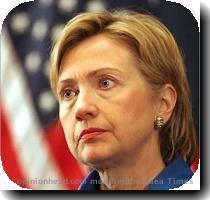Religious violence, ill president and oil worries plague Nigeria
By Jon Gambrell, APWednesday, February 3, 2010
Ill leader, violence and oil woes plague Nigeria
LAGOS, Nigeria — Nigeria’s president has been away ill for more than two months. A militant group vows to renew its war against the oil industry. And Muslim-Christian violence has drawn a threat of jihad from an al-Qaida-linked group.
Conflict and the leadership vacuum are raising so much concern about the stability of Africa’s most populous nation and third biggest supplier of oil to the U.S. that the military has felt obliged to assure the world that it isn’t planning a coup d’etat.
Nigeria has a history of coups and military dictatorships, and when President Umaru Yar’Adua was inaugurated in May 2007, it was the first time since Nigeria gained independence from Britain in 1960 that power passed between two civilians.
But Yar’Adua didn’t officially leave anyone in charge when he left for treatment in Saudi Arabia of a serious heart condition in late November, and things back home are starting to unravel.
In the past, such a power vacuum would often trigger a coup, and last week Air Marshal Paul Dike announced last week that troops would be restricted to their bases indefinitely, in case any of them were thinking of taking matters into their own hands.
“Ours is a military that is mindful of its past, conscious of its present and hopeful of the future,” he said.
Meanwhile, sectarian violence has erupted and the oil-rich Niger Delta is also under threat.
Before leaving Nigeria, Yar’Adua brokered a cease-fire with the main militant group in the Delta. But on Saturday, the Movement for the Emancipation of the Niger Delta called off the cease-fire and vowed to burn oil installations to the ground.
“Nothing will be spared,” it said, accusing the government of failing to deliver on promises to develop the impoverished region. Militants suspect the amnesty benefits promised by Yar’Adua, including cash payments to former fighters, were frozen in his absence.
Nigeria had been Africa’s top oil producer, but fell to Angola last year because the violence drove production down by about 1 million barrels a day. Most of the oil heads to the U.S. — 948,000 barrels a day in November, according to U.S. government statistics.
Olusegun Obasanjo, Yar’Adua’s civilian predecessor, has urged the president to take “the path of honor” and resign if he is medically unfit to serve. And in a statement Jan. 28, former leaders and government officials urged Yar’Adua to formally appoint Vice President Goodluck Jonathan to stand in for him.
On the same day came an open letter from U.S. Secretary of State Hillary Clinton, her British and French counterparts David Miliband and Bernard Kouchner, and European Union High Representative Catherine Ashton, urging Nigeria to obey its constitutional chain of command.
“Nigeria’s continued commitment and adherence to its democratic norms and values are key to addressing the many challenges it faces,” it said.
But murmurs on the street and discussions among academics often raise the question of whether it’s worth saving a system that allows politicians to rob the nation’s oil coffers while many Nigerians live on less than $2 a day.
“If you are going to have a democracy, there must be a stake for every individual in the economy. If you have no stake in the economy, what are you fighting for?” said Peter Alexander Egom, an analyst at the Nigerian Institute of International Affairs. “Unless it hits bottom, nothing will change.”
Compounding Nigeria’s problems was an outbreak of fighting last month between Christians and Muslims in the central town of Jos. Jonathan ordered army troops to restore order, but more than 300 people died, including babies. Some victims were stuffed into wells.
Although the fighting didn’t spread, it has drawn attention to the difficulties that could arise for a nation whose population of 150 million is half Muslim and half Christian if Yar’adua can’t serve out his term.
The presidency is supposed to alternate between a Muslim and a Christian. Yar’Adua is Muslim and it’s unclear whether Muslims would be willing to cede half his term to Jonathan, who is constitutionally next in line but is Christian.
More than 13,500 people have been killed in Muslim-Christian violence in the past decade. Its roots are not purely religious and are often are embedded in struggles for political and economic dominance, as was the case in Jos.
Still, an al-Qaida-linked group that carries out attacks and kidnappings in nearby Saharan countries on Monday painted the bloodshed in Jos as a religious war and said in a communique posted on a jihadist Web site that it wants to send fighters to arm and train Nigerian Muslims “to repulse the hostility of the Crusader minority.”
The group, Al-Qaida in the Islamic Maghreb, hasn’t achieved a foothold in Nigeria, although Nigerian security forces claimed to have broken up an al-Qaida-linked terror cell in November 2007
Experts say young Muslims are ripe for recruitment, and not just the poor. Umar Farouk Abdulmutallab, the Nigerian who allegedly tried to blow up a Detroit-bound airliner on Christmas Day, came from a wealthy family.
Security officials say calls to violence are also coming from some extremist religious leaders in the Muslim-dominated north.
“You do have a group of impressionable people who are vulnerable to the extremist messages of some of these imams,” said Richard Downie, a fellow at the Washington-based Center for Strategic and International Studies.
Tags: Africa, Contracts And Orders, Coups D'etat, Diseases And Conditions, Geography, Hillary Clinton, Infectious Diseases, Lagos, Middle East, Nigeria, North America, Religious Strife, Saudi Arabia, United States, West Africa

